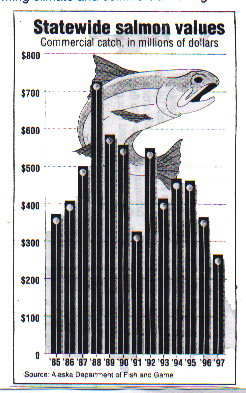 This collection of student work is from Frank Keim's classes. He wants to share these works for others to use as an example of culturally-based curriculum and documentation. These documents have been OCR-scanned and are available for educational use only.
This collection of student work is from Frank Keim's classes. He wants to share these works for others to use as an example of culturally-based curriculum and documentation. These documents have been OCR-scanned and are available for educational use only.Special | A | B | C | D | E | F | G | H | I | J | K | L | M | N | O
P | Q | R | S | T | U | V | W | X | Y | Z | ALL
The Bering Sea is Ill:The Bering Sea is Ill
The Bering Sea, an immensely diverse and hugely productive system, is showing signs of stress if not outright sickness from natural and man-made causes, according to a new report from the Interior Department. Deborah Williams, Department of Interior Secretary Bruce Babbitt's special assistant for Alaska, says the report stems from a growing concern that rising pollution and falling populations of some fish, birds and marine mammals in the Bering Sea are biological warning signals that the system is under stress. They studied Aleutian green-winged teals and found that a quarter of their eggs had mercury levels high enough to cause deformities in laboratory chickens. The Bering Sea ecosystem is as complex and subtle as it is diverse and productive. They say that there aren't many ecosystems that are so productive and not already severely damaged. The million square mile sea is home to at least twenty-five species of marine mammals, 450 kinds of fish and shellfish, and more than fifty species of seabirds. It supports a commercial fishery worth more than $1 billion a year which is fifty-six percent of the nation's commercial catch. Many of these animal species populations are declining, including Steller sea lions, fur seals, sea otters and seabirds such as murres and kittiwakes. The winter ice pack has been steadily shrinking, shifting the ice edge, an especially productive biological zone, to the north. Persistent environmental contaminants such as PCB's, the pesticide DDT and mercury are showing up in high concentrations in the tissues of birds and mammals, including bald eagle eggs collected on the Aleutian Chain. They say whatever caused those changes, is a puzzle. A report by the National Research Council last year suggested the Bering ecosystem has been changed by causes such as commercial whaling in the 1800's, and a warming climate and commercial fishing in the past thirty years. Tatiana Sergie  | |
|



